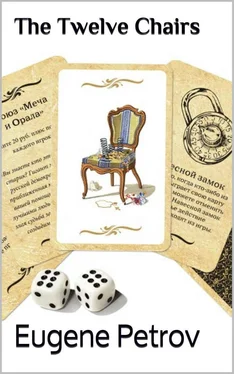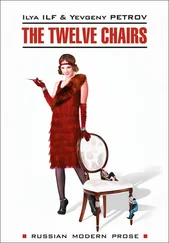Eugene Petrov - The Twelve Chairs
Здесь есть возможность читать онлайн «Eugene Petrov - The Twelve Chairs» весь текст электронной книги совершенно бесплатно (целиком полную версию без сокращений). В некоторых случаях можно слушать аудио, скачать через торрент в формате fb2 и присутствует краткое содержание. Год выпуска: 2013, Жанр: Юмористическая проза, на английском языке. Описание произведения, (предисловие) а так же отзывы посетителей доступны на портале библиотеки ЛибКат.
- Название:The Twelve Chairs
- Автор:
- Жанр:
- Год:2013
- ISBN:нет данных
- Рейтинг книги:5 / 5. Голосов: 1
-
Избранное:Добавить в избранное
- Отзывы:
-
Ваша оценка:
- 100
- 1
- 2
- 3
- 4
- 5
The Twelve Chairs: краткое содержание, описание и аннотация
Предлагаем к чтению аннотацию, описание, краткое содержание или предисловие (зависит от того, что написал сам автор книги «The Twelve Chairs»). Если вы не нашли необходимую информацию о книге — напишите в комментариях, мы постараемся отыскать её.
Find traces of a separate headset difficult and heroes face different adventures and troubles.
The Twelve Chairs — читать онлайн бесплатно полную книгу (весь текст) целиком
Ниже представлен текст книги, разбитый по страницам. Система сохранения места последней прочитанной страницы, позволяет с удобством читать онлайн бесплатно книгу «The Twelve Chairs», без необходимости каждый раз заново искать на чём Вы остановились. Поставьте закладку, и сможете в любой момент перейти на страницу, на которой закончили чтение.
Интервал:
Закладка:
roubles in his pocket-getting home was definitely out of the question.
Father Theodore passed the Turkish bazaar-where he was advised in a
perfect stage whisper to buy some Coty powder, silk stockings and contraband
Batumi tobacco-dragged himself to the station, and lost himself in the crowd
of porters.
CHAPTER THIRTY-EIGHT
UP IN THE CLOUDS
Three days after the concessionaires' deal with Mechnikov the fitter,
the Columbus Theatre left by railway via Makhacha-Kala and Baku. The whole
of these three days the concessionaires, frustrated by the contents of the
two chairs opened on Mashuk, waited for Mechnikov to bring them the third of
the Columbus chairs. But the narzan-tortured fitter converted the whole of
the twenty roubles into the purchase of plain vodka and drank himself into
such a state that he was kept locked up in the props room.
"That's Mineral Waters for you!" said Ostap, when he heard about the
theatre's departure. "A useful fool, that fitter. Catch me having dealings
with theatre people after this!"
Ostap became much more nervy than before. The chances of finding the
treasure had increased infinitely.
"We need money to get to Vladikavkaz," said Ostap. "From there we'll
drive by car to Tiflis along the Georgian Military Highway. Glorious
scenery! Magnificent views! Wonderful mountain air! And at the end of it
all-one hundred and fifty thousand roubles, zero zero kopeks. There is some
point in continuing the hearing."
But it was not quite so easy to leave Mineral Waters. Vorobyaninov
proved to have absolutely no talent for bilking the railway, and so when all
attempts to get him aboard a train had failed he had to perform again in the
Flower Garden, this time as an educational district ward. This was not at
all a success. Two roubles for twelve hours' hard and degrading work, though
it was a large enough sum for the fare to Vladikavkaz.
At Beslan, Ostap, who was travelling without a ticket, was thrown off
the train, and the smooth operator impudently ran behind it for a mile or
so, shaking his fist at the innocent Ippolit Matveyevich.
Soon after, Ostap managed to jump on to a train slowly making its way
to the Caucasian ridge. From his position on the steps Ostap surveyed with
great curiosity the panorama of the mountain range that unfolded before him.
It was between three and four in the morning. The mountain-tops were
lit by dark pink sunlight. Ostap did not like the mountains.
"Too showy," he said. "Weird kind of beauty. An idiot's imagination. No
use at all."
At Vladikavkaz station the passengers were met by a large open bus
belonging to the Transcaucasian car-hire-and-manufacturing society, and
nice, kind people said:
"Those travelling by the Georgian Military Highway will be taken into
the town free."
"Hold on, Pussy," said Ostap. "We want the bus. Let them take us free."
When the bus had given him a lift to the centre of the town, however,
Ostap was in no hurry to put his name down for a seat in a car. Talking
enthusiastically to Ippolit Matveyevich, he gazed admiringly at the view of
the cloud-enveloped Table Mountain, but finding that it really was like a
table, promptly retired.
They had to spend several days in Vladikavkaz. None of their attempts
to obtain money for the road fare met with any success, nor provided them
with enough money to buy food. An attempt to make the citizens pay ten-kopek
bits failed. The mountain ridge was so high and clear that it was not
possible to charge for looking at it. It was visible from practically every
point, and there were no other beauty spots in Vladikavkaz. There was the
Terek, which flowed past the "Trek", but the town charged for entry to that
without Ostap's assistance. The alms collected in two days by Ippolit
Matveyevich only amounted to thirteen kopeks.
"There's only one thing to do," said Ostap. "We'll go to Tiflis on
foot. We can cover the hundred miles in five days. Don't worry, dad, the
mountain view is delightful and the air is bracing . . . We only need money
for bread and salami sausage. You can add a few Italian phrases to your
vocabulary, or not, as you like; but by evening you've got to collect at
least two roubles. We won't have a chance to eat today, dear chum. Alas!
What bad luck!"
Early in the morning the partners crossed the little bridge across the
Terek river, went around the barracks, and disappeared deep into the green
valley along which ran the Georgian Military Highway.
"We're in luck, Pussy," said Ostap. "It rained last night so we won't
have to swallow the dust. Breathe in the fresh air, marshal. Sing something.
Recite some Caucasian poetry and behave as befits the occasion."
But Ippolit Matveyevich did not sing or recite poetry. The road went
uphill. The nights spent in the open made themselves felt by pains in his
side and heaviness in his legs, and the salami sausage made itself felt by a
constant and griping indigestion. He walked along, holding in his hand a
five-pound loaf of bread wrapped in newspaper, his left foot dragging
slightly.
On the move again! But this time towards Tiflis; this time along the
most beautiful road in the world. Ippolit Matveyevich could not have cared
less. He did not look around him as Ostap did. He certainly did not notice
the Terek, which now could just be heard rumbling at the bottom of the
valley. It was only the ice-capped mountain-tops glistening in the sun which
somehow reminded him of a sort of cross between the sparkle of diamonds and
the best brocade coffins of Bezenchuk the undertaker.
After Balta the road entered and continued as a narrow ledge cut in the
dark overhanging cliff. The road spiralled upwards, and by evening the
concessionaires reached the village of Lars, about three thousand feet above
sea level.
They passed the night in a poor native hotel without charge and were
even given a glass of milk each for delighting the owner and his guests with
card tricks.
The morning was so glorious that Ippolit Matveyevich, braced by the
mountain air, began to stride along more cheerfully than the day before.
Just behind Lars rose the impressive rock wall of the Bokovoi ridge. At this
point the Terek valley closed up into a series of narrow gorges. The scenery
became more and more sombre, while the inscriptions on the cliffs grew more
frequent At the point where the cliffs squeezed the Terek's flow between
them to the extent that the span of the bridge was no more than ten feet,
the concessionaires saw so many inscriptions on the side of the gorge that
Ostap forgot the majestic sight of the Daryal gorge and shouted out, trying
to drown the rumble and rushing of the Terek:
"Great people! Look at that, marshal! Do you see it? Just a little
higher than the cloud and slightly lower than the eagle! An inscription
which says, 'Micky and Mike, July 1914'. An unforgettable sight! Notice the
artistry with which it was done. Each letter is three feet high, and they
used oil paints. Where are you now, Nicky and Mike?"
"Pussy," continued Ostap, "let's record ourselves for prosperity, too.
I have some chalk, by the way. Honestly, I'll go up and write 'Pussy and
Ossy were here'."
And without giving it much thought, Ostap put down the supply of
sausage on the wall separating the road from the seething depths of the
Terek and began clambering up the rocks. At first Ippolit Matveyevich
Читать дальшеИнтервал:
Закладка:
Похожие книги на «The Twelve Chairs»
Представляем Вашему вниманию похожие книги на «The Twelve Chairs» списком для выбора. Мы отобрали схожую по названию и смыслу литературу в надежде предоставить читателям больше вариантов отыскать новые, интересные, ещё непрочитанные произведения.
Обсуждение, отзывы о книге «The Twelve Chairs» и просто собственные мнения читателей. Оставьте ваши комментарии, напишите, что Вы думаете о произведении, его смысле или главных героях. Укажите что конкретно понравилось, а что нет, и почему Вы так считаете.












